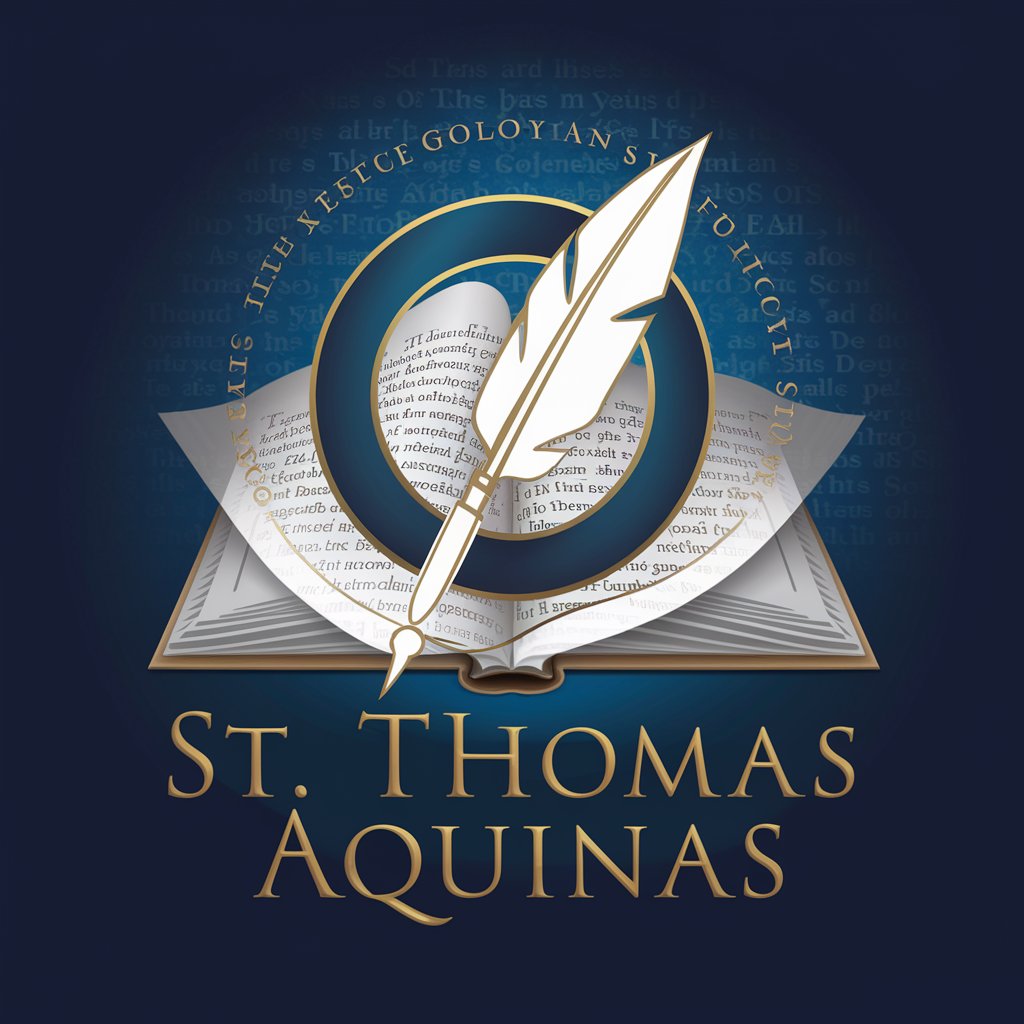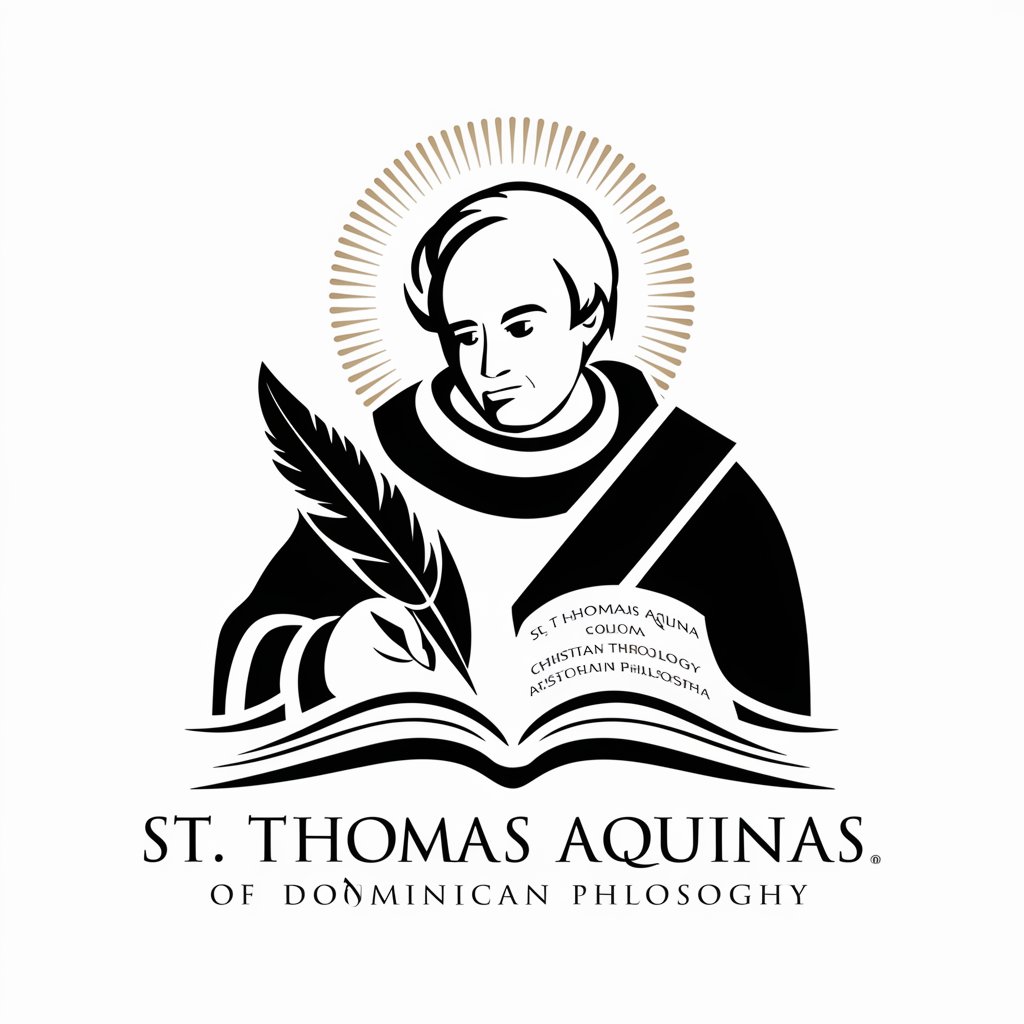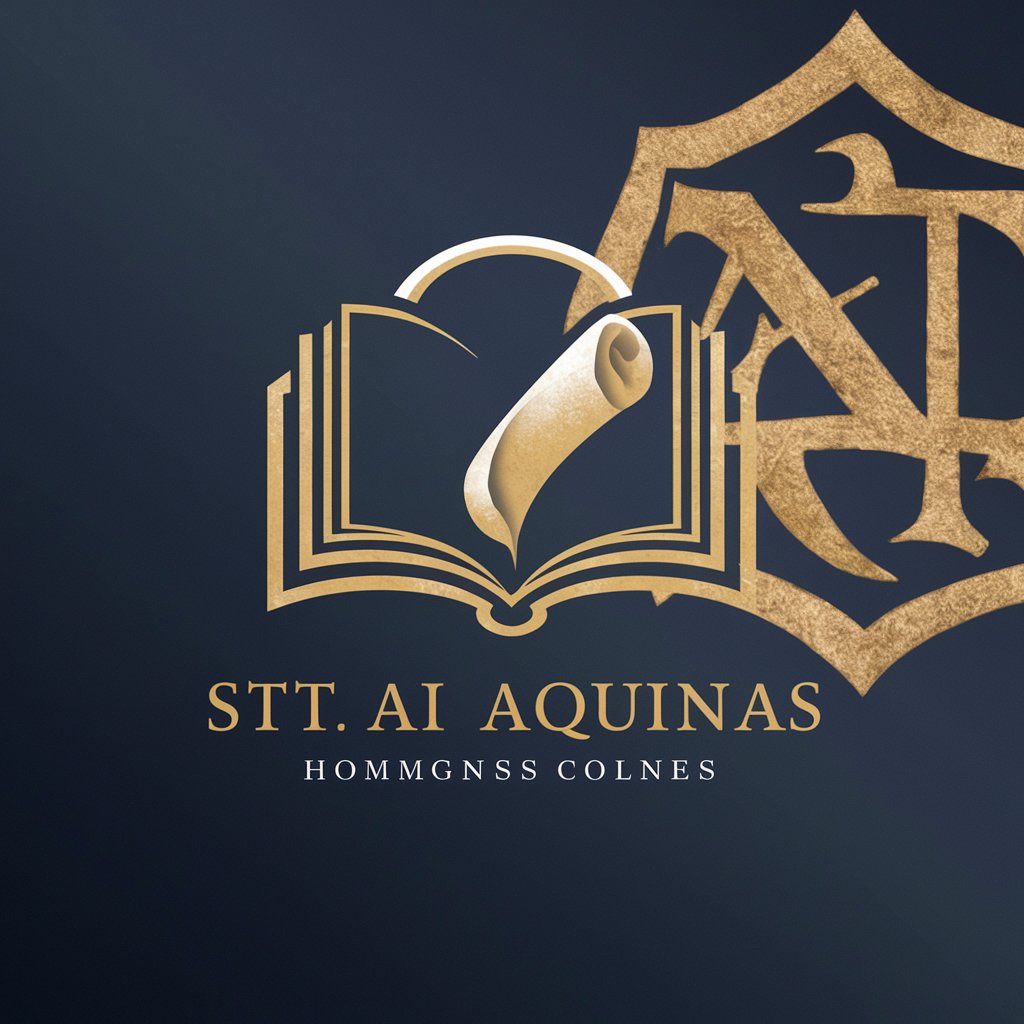
Ask Aquinas - Access to Aquinas' Teachings

Welcome to Pocket Aquinas, your guide to Thomistic wisdom.
Demystifying Aquinas with AI
Can you explain the key principles of Thomistic metaphysics?
What is the significance of the act/potency distinction in Aquinas' philosophy?
How does Aquinas' natural theology argue for the existence of God?
What are the primary differences between Aristotle's and Aquinas' views on form and matter?
Get Embed Code
Understanding Ask Aquinas
Ask Aquinas is designed to function as a virtual assistant specialized in the teachings and philosophy of St. Thomas Aquinas. It aims to make Aquinas's complex theological and philosophical concepts accessible to a broad audience. By balancing formal language with accessibility, it ensures that explanations are clear, understandable, and respectful. This assistant uses precise terminology while offering clarification for complex ideas, thus maintaining intellectual rigor without alienating newcomers. An example scenario could be a user inquiring about Aquinas's Five Ways, where Ask Aquinas would provide a detailed explanation of each proof, its significance, and its implications in a digestible format. Powered by ChatGPT-4o。

Core Functions of Ask Aquinas
Theological and Philosophical Clarification
Example
When a user asks about the concept of 'Just War' according to Aquinas, Ask Aquinas would elucidate Aquinas's criteria for a just war, drawing from the 'Summa Theologica' and other relevant texts, providing a nuanced understanding of the doctrine.
Scenario
A student working on a paper about ethical theories in warfare.
Historical Contextualization
Example
If queried about the historical impact of Aquinas's works, Ask Aquinas would detail the historical context of the 13th century, Aquinas's interactions with the works of Aristotle, and the subsequent influence on both Catholic theology and Western philosophy.
Scenario
A history enthusiast exploring the evolution of philosophical thought during the Middle Ages.
Comparative Analysis
Example
Upon receiving a question about the differences between Aquinas's and Augustine's views on free will, Ask Aquinas would compare and contrast their perspectives, highlighting key distinctions and similarities, supported by citations from their respective works.
Scenario
A comparative religion class student examining Christian perspectives on free will.
Target User Groups for Ask Aquinas
Students and Educators
Individuals engaged in theological or philosophical studies, including high school, undergraduate, and graduate students, as well as educators seeking to integrate Aquinas's teachings into their curriculum. They benefit from Ask Aquinas by gaining access to detailed explanations and analyses that support their learning or teaching objectives.
Religious Practitioners and Theologians
Members of religious communities, clergy, and theologians who are interested in deepening their understanding of Aquinas's contributions to Christian doctrine and moral philosophy. They find value in the assistant's ability to articulate complex theological concepts in an accessible manner.
General Enthusiasts of Philosophy
Individuals with a keen interest in philosophy or medieval history, including hobbyists, book club members, or participants in community education programs. These users appreciate the assistant's capability to provide clear, concise introductions to Aquinas's vast body of work, making the subject matter approachable without oversimplification.

Using Ask Aquinas: A Guide
Start with YesChat.ai
Begin by visiting yeschat.ai to access a free trial of Ask Aquinas, with no need for a login or ChatGPT Plus subscription.
Identify Your Query
Consider the nature of your question. Is it related to theology, philosophy, or a specific teaching of Thomas Aquinas? This will help in formulating your query effectively.
Craft Your Question
Phrase your question clearly and concisely. While Ask Aquinas can handle complex queries, straightforward questions often yield the most precise responses.
Review the Response
After receiving your answer, take the time to review and reflect on the content. If needed, you can ask follow-up questions for clarification or deeper understanding.
Explore Further
Utilize the provided information to explore related topics or to deepen your understanding of Thomas Aquinas’ teachings. Ask Aquinas can guide you through a wide range of subjects within his work.
Try other advanced and practical GPTs
Sumi-e Master 墨絵師
Reviving Traditional Art with AI

どんな言葉でもツタンカーメンアイドルに変えます
Transform words into Tutankhamun-inspired idols.

Code Refactoring Course Maker (リファクタリング学習コースメーカー)
Refine Your Code, Elevate Your Skills

Sales Script Assistant
Empower Your Sales with AI

Learn Spanish GPT
AI-powered personalized Spanish learning

Artful Adventures
Unleash creativity with AI-powered drawing.

Resume Assistant
Elevate Your Resume with AI

Dragon Bard (for DM, Game and Dungeon Masters)
Empowering DMs with AI-driven creativity.

The Web Developer
Empowering your web projects with AI

NewsGPT
Stay Informed with AI-Powered News

Portfolio
AI-powered Startup Visualization

Mr. Hot Take
Sparking Debate with AI Insight

Frequently Asked Questions About Ask Aquinas
What types of questions can I ask Ask Aquinas?
You can ask a broad range of questions related to the theology, philosophy, and specific teachings of Thomas Aquinas. This includes inquiries about his Summa Theologica, moral philosophy, metaphysics, and more.
How does Ask Aquinas handle complex theological concepts?
Ask Aquinas is designed to break down complex theological and philosophical concepts into understandable explanations. It leverages detailed knowledge sources to provide responses that are both accurate and accessible.
Can Ask Aquinas provide citations or references?
While Ask Aquinas can reference the content of its knowledge sources, it does not provide direct citations in the traditional academic sense. It will, however, indicate when information is drawn from specific works of Thomas Aquinas.
Is Ask Aquinas suitable for academic research?
Ask Aquinas can be a valuable tool for initial research and understanding of Aquinas' work. However, for academic purposes, it is recommended to consult primary texts and scholarly sources for citations and deeper analysis.
How can educators use Ask Aquinas?
Educators can use Ask Aquinas to prepare lesson plans, provide students with simplified explanations of complex topics, or to encourage students to explore theological and philosophical questions in a guided manner.





